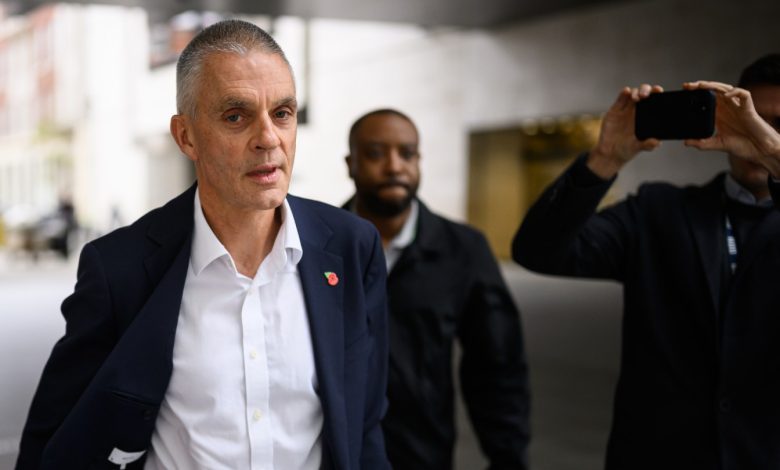Inside the BBC Meltdown: How a Trump Lawsuit and a Leaked Memo Brought Down Its Top Brass

Donald Trump is waving a $1 billion lawsuit at the BBC after a leaked memo found that a speech of his was doctored to make it appear as though he encouraged the Capitol riot on Jan. 6, 2021.
The controversy has led to an implosion at the BBC: two of its senior executives have resigned, including top boss Tim Davie, with the fallout threatening to linger for weeks, if not months.
The British broadcaster has been plagued by scandal for some years, with the Israel-Gaza war and rise of the far-right making an already difficult job much, much harder.
Below, The Hollywood Reporter takes a deep-dive into all the facts of this fast-developing story, and why it’s brought the BBC to an inflection point.
What is the BBC, and why is it so fundamental in the U.K.?
It’s important to note just how central the BBC is to U.K. culture before getting into the latest controversy and how we got here.
The British Broadcasting Corporation is a unique beast. Over 100 years old, the BBC is an institution here in the U.K. and is, definitively, the leading news outlet in Britain.
Data released earlier this year from independent research company Tapestry found the BBC to be the most trusted international news provider amongst all audiences. It is far and away the U.K.’s best-performing cultural export and, per figures released in the BBC’s annual report, reaches over 450 million people around the world every week. To drive home how integral its news and current affairs output is to Britain’s media landscape, the BBC found that 74 percent of U.K. adults use BBC News on average per week. This audience has been built through a steadfast, unwavering commitment to impartial and accurate journalism.
The BBC is also a provider of television and film, produced through its commercial arm BBC Studios and responsible for some of your favorite shows and movies.
The broadcaster is mostly funded by something called the license fee. By law, every household in the U.K. has to pay this fee to the BBC if they watch or record programs as they’re shown live on any TV channel, watch programs live on streaming services or download, or watch shows on BBC iPlayer. Currently, the license fee is an annual payment of £174.50 ($229) and last year, this generated £3.8 billion ($4.96 billion) for the BBC.
Who are Tim Davie and Deborah Turness?
Tim Davie is one of the BBC’s longest-serving executives. He’s been at the corporation since 2005 after leaving his role as vice president of marketing and franchise at PepsiCo. Through his 20 years at the BBC, Davie has ran various radio stations and also been the chief executive of the corporation’s commercial arm, BBC Worldwide, where he weathered significant storms. In 2020, he was tapped to become the BBC’s director-general, where he has been widely considered a formidable leader and a staunch defender of the BBC’s journalistic integrity.
Director-general is the top job at the BBC. Davie is the BBC’s editorial, operational and creative leader, responsible for its sector-spanning services across television, radio and online. The only role that might rival the director-general in power is the BBC chair, a position currently held by a man named Samir Shah.
Deborah Turness has decades of experience in news and current affairs programming. She became CEO of BBC News and Current Affairs in 2022 after leading production rival ITN through its post-COVID strategy as CEO in 2021. Prior to that, Turness was the first president of NBC News International, the global arm of the U.S. news network.
As CEO of BBC News, she oversaw the entirety of BBC News’ programming and output, and was responsible for a team of around 6,000 people broadcasting to almost half a billion around the globe in more than 40 languages.
Why have they resigned?
On Sunday, both Davie and Turness resigned after The Telegraph published a leaked memo from a man named Michael Prescott.
Prescott, an ex-political journalist, worked as an independent adviser to the BBC’s Editorial Guidelines and Standards Board (EGSB) for three years before leaving in June this year. The EGSB is an internal BBC body, responsible for setting and approving the editorial standards for all BBC content. Basically, it’s there to ensure the BBC stays impartial and accurate, as well as review any complaints that pop up. Prescott has government ties, too — he’s a member of the government’s Advisory Committee on Business Appointments, which means he offers independent advice to the British prime minister.
In Prescott’s leaked memo, he raises five key shortcomings of the BBC. The first is that, on the BBC’s investigative documentary channel Panorama, a program titled Trump: A Second Chance? “seemed to be taking a distinctly anti-Trump stance.” In the doc, the BBC was found to have edited a Jan. 6, 2021, address where Trump, speaking before the attack on the Capitol in Washington D.C., seemed to appear as though he was encouraging the riots.
In the speech, Trump said: “We’re going to walk down to the Capitol, and we’re going to cheer on our brave senators and congressmen and women.” However, in the Panorama edit, he was shown saying: “We’re going to walk down to the Capitol … and I’ll be there with you. And we fight. We fight like hell.” The two clips stitched together were, in actuality, more than 50 minutes apart.
Shah has admitted in a lengthy letter that this edit was “an error of judgement.” But because the issue was handled as part of a wider review of the BBC’s U.S. election coverage and not as a specific program complaint, “the point wasn’t pursued further at the time,” added the BBC chair. “The points raised in the review were relayed to the Panorama team, including the decision-making on this edit. With hindsight, it would have been better to take more formal action,” he concluded.
How has Trump responded?
The U.S. President has, unsurprisingly, threatened the BBC with a $1 billion lawsuit over the doctored clip of his speech. The BBC received a letter from Trump’s legal team that has demanded the retraction of “false, defamatory, disparaging, misleading, and inflammatory statements” and compensation for “harm caused,” or face legal action in Florida. The BBC has said it will respond in due course.
Trump celebrated the news of the resignations, posting on Truth Social: “The TOP people in the BBC, including TIM DAVIE, the BOSS, are all quitting/FIRED, because they were caught ‘doctoring’ my very good (PERFECT!) speech of January 6th,” he wrote, calling those involved “corrupt” journalists. “These are very dishonest people who tried to step on the scales of a Presidential Election. On top of everything else, they are from a Foreign Country, one that many consider our Number One Ally. What a terrible thing for Democracy!”
For myriad reasons, including the BBC’s enormous influence in the U.K., as well as its commitment to providing impartial, factually accurate and precise journalism, the network has been something of a punching bag for right-wingers as Britain’s political landscape continues to splinter. As is the case in the U.S., far-right politicians have taken a hard-line stance on contentious issues such as immigration, trans rights and climate change. This shift is reflected in Britain’s increasingly polarized media coverage, with attempts to recreate a Fox News-esque channel called GB News, on which far-right party leader Nigel Farage has a prime-time show. With Trump’s attack on the mainstream media going global, it emboldens politicians like Farage to continue MAGA-ifying their campaigns (Make Britain Great Again caps speckled Farage’s recent Reform U.K. party conference).
This is to say that the BBC’s mistake has serious political ramifications in Britain, and underlines the severity of what’s occurred. It pedals the increasingly popular idea that the BBC, of all outlets, is not to be trusted. Some U.K. politicians, such as centrist party leader Ed Davey, have attempted to pour oil on troubled waters here: “The BBC isn’t perfect, but it belongs to Britain, not Trump,” said Davey on Monday. “Political leaders across the U.K. must unite in defending its independence from the White House.”
What else was raised in the leaked memo?
Prescott’s memo also referenced the BBC’s coverage of the Israel-Gaza war. He noted that several contributors to the BBC’s Arabic service had selectively covered stories critical of Israel. For example, the BBC’s main news website posted 19 separate stories about the hostages taken by Hamas on the day of the Oct. 7 attack, The Telegraph said, but on BBC Arabic there were none. By contrast, the memo continued, every critical article about Israel that appeared on BBC News’ English website was replicated by BBC Arabic. Among other concerns, there were also no articles critical of Hamas on the BBC Arabic site and four on the English site. Prescott was troubled by the significant differences in tone, headlines and emphasis when covering the war, and condemned the BBC for allegedly misreporting the proportion of Palestinian women and children killed by Israeli military actions.
Another issue raised in the memo was Prescott’s assertion that stories raising “difficult questions” about transgender issues were ignored, even if they had been widely taken up and discussed across other media outlets. News features about transgender people and the transgender experience were said to be one-sided, “celebrating the trans experience without adequate balance or objectivity,” per The Telegraph. Other stories, including a group of nurses who sued their employer for “permitting biological males to use their changing room,” were not covered at all.
The final two problems raised by Prescott were on racism and immigration issues. “During my time as an advisor… it became clear the BBC fell too easily for putting out ill-researched material that suggested issues of racism when there were none,” he concluded. He also said senior BBC staff members were informed of “selection bias” in favor of certain immigration stories being sent out through push notifications to more than seven million users of the BBC News app.
Why this memo has blown up the BBC
The BBC is at an inflection point. The severity of the concerns listed above, together with the corporation’s domination of the British media, means senior heads had to roll. You can’t potentially defame a sitting U.S. president without damaging public opinion — and that kind of trust is absolutely everything the BBC prides itself on. But this implosion has been festering for some time.
In recent years, Davie has managed to withstand an onslaught of scandal. Occasions that have required him to make a statement include: a predator presenter pleading guilty to making indecent images of children, BBC MasterChef stars sacked over claims of inappropriate behavior on set and widespread bullying allegations on the set of Strictly Come Dancing. This is not including the outrage sparked by a Glastonbury set in June, where music act Bob Vylan chanted “death, death to the IDF.” The BBC, Glastonbury’s official TV partner, did not cut the set’s livestream and later apologized. These events — and others — have chewed away at the BBC’s popularity.
Resigning over this incident after surviving so many previous hurdles suggests the situation among senior officials at the BBC was at tipping point. No one would doubt Davie is weary, of course, but various reports have alleged that his and Turness’ resignations were a planned “coup” at the BBC from top execs keen to see upheaval at the organization.
Other reports, including from The Guardian, have said the whole ordeal is much more politically motivated than it might seem, and that right-leaning members of the BBC board pushed to get Davie and Turness out. This would confirm suspicions that the increasingly partitioned political landscape is turning the BBC’s editorial output into an impossible balancing act.
What remains obvious is that the BBC cannot put a foot wrong in the coming weeks. Rumors will no doubt begin to swirl around who might replace Davie and Turness. For now, anyway, Turness’ deputy Jonathan Munro is taking on her job. Davie is staying director-general until an “orderly transition” is planned with the board.
The outgoing BBC boss said on a 40-minute call with staff on Tuesday that he is “fiercely proud” of the BBC. “Mistakes have cost us,” he said, but added: “I think we’ve got to fight for our journalism.”
HiCelebNews online magazine publishes interesting content every day in the celebrity section of the entertainment category. Follow us to read the latest news.





